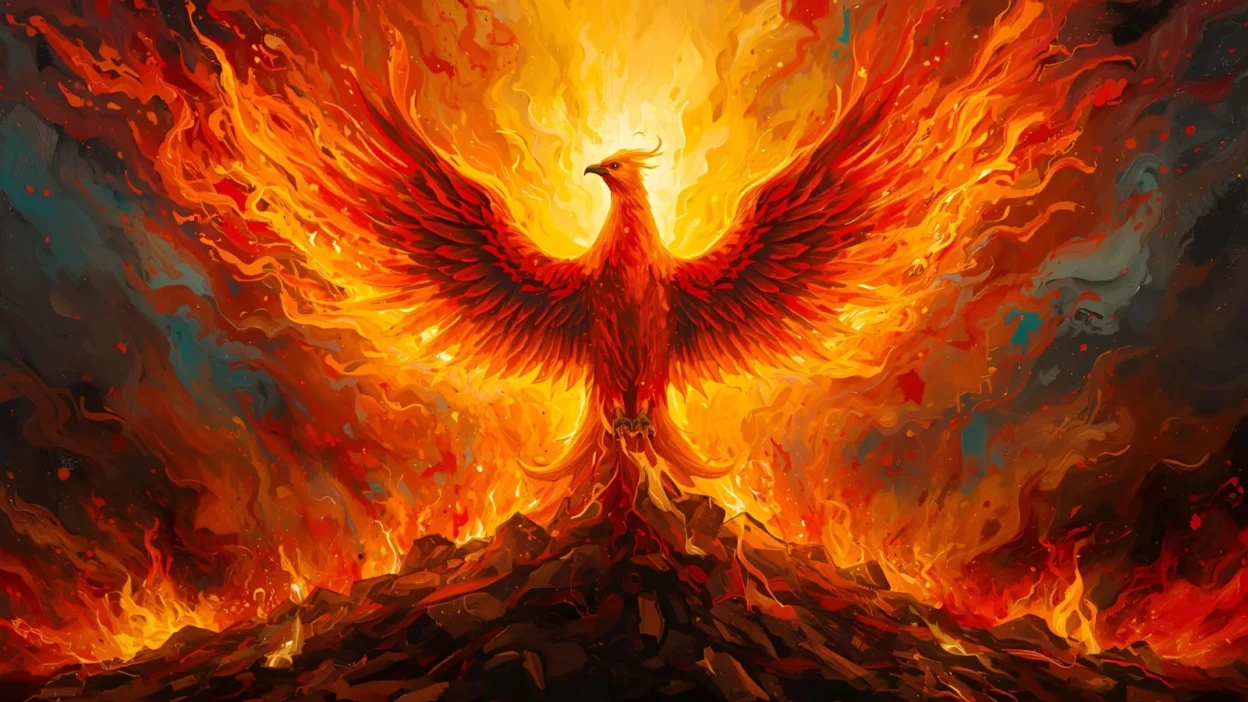There’s something hauntingly beautiful about fire. It burns, it destroys, and yet it creates space for new beginnings. In Ray Bradbury’s Fahrenheit 451, fire isn’t just an element — it’s a living, breathing symbol of transformation, destruction, and awakening. When readers encounter fire symbolism in Fahrenheit 451, they often find themselves reflecting on their own spiritual relationship with change, power, and rebirth.
Imagine standing before a flame — its warmth comforts, but its intensity warns. That’s exactly what Bradbury wanted us to feel. In a world where books are banned, and independent thought is punished, fire becomes a paradox: a tool of oppression and a symbol of renewal.
Spiritually, fire in the novel represents the eternal human struggle — between ignorance and enlightenment, destruction and rebirth, darkness and illumination. Through Montag’s journey, Bradbury invites us to ask: What must we burn away to truly awaken?
Let’s dive deeper into the flames of meaning behind fire symbolism in Fahrenheit 451, exploring how this sacred element — along with mirrors, salamanders, and phoenixes — reveals the soul’s desire for truth, transformation, and freedom.
Fire Symbolism in Fahrenheit 451 Quotes
- “It was a pleasure to burn.” — the book’s opening line sets the tone for how distorted pleasure has become in Montag’s world.
- Spiritually, this quote shows how humanity often finds comfort in destruction when disconnected from truth.
- The act of burning books mirrors the burning of wisdom — a spiritual death.
- Another quote, “The fire was bright and clean,” reflects society’s illusion that destruction brings purity.
- Fire symbolizes both corruption and cleansing, making it the novel’s most complex metaphor.
- Montag’s relationship with fire evolves — from obedience to awakening.
- “The sun burnt every day.” symbolizes the eternal fire of creation, contrasting man’s artificial flames.
- Fire becomes a mirror for human consciousness, reflecting both ego and enlightenment.
- The more Montag awakens, the more he sees fire as rebirth, not ruin.
- Spiritually, these quotes remind us that fire’s meaning depends on the intention behind the flame.
Salamander Symbolism in Fahrenheit 451
- The salamander, often seen on the firefighters’ uniforms, represents resilience and adaptation.
- In ancient mythology, salamanders were believed to live in fire without being consumed.
- This connects to the firefighters, who “play” with fire but are spiritually numb to its destruction.
- Spiritually, the salamander is a symbol of denial — existing amid danger yet pretending it’s harmless.
- For Montag, wearing the salamander emblem symbolizes his old identity trapped in illusion.
- As his consciousness evolves, the salamander becomes a symbol of inner resistance.
- It’s a reminder that some souls live in chaos yet never burn — they adapt instead of awaken.
- The salamander teaches that survival without transformation is not truly living.
- It reflects the human tendency to normalize destruction rather than heal it.
- In Montag’s spiritual journey, the salamander marks the phase before awakening — a stage of endurance before enlightenment.
Mirror Symbolism in Fahrenheit 451
- The mirror in the novel symbolizes self-reflection and awakening.
- When Montag looks at himself metaphorically, he sees not a savior, but a reflection of the system.
- Spiritually, mirrors represent truth — what’s hidden must eventually be faced.
- Granger’s line, “We must all be mirrors and reflect what we see,” speaks to collective awakening.
- The mirror invites characters to look beyond illusion and vanity.
- It asks: “What have I become in a world that fears truth?”
- Mirrors symbolize inner sight — the courage to face one’s shadow.
- For Montag, the mirror is his soul’s turning point, where ignorance melts into awareness.
- The mirror is not gentle — it’s a spiritual confrontation.
- By the novel’s end, mirrors become symbols of rebirth through self-honesty.
Hearth Symbolism in Fahrenheit 451
- The hearth, often paired with fire, symbolizes home, warmth, and comfort.
- In Bradbury’s world, the hearth is ironic — warmth without soul, comfort without truth.
- Spiritually, it represents emotional emptiness disguised as contentment.
- Montag’s hearth burns with routine, not passion.
- The hearth asks readers: “Are you truly alive, or just comfortably asleep?”
- It’s the illusion of safety in a world where the soul starves for meaning.
- The hearth shows how false warmth can numb spiritual growth.
- When Montag begins to awaken, he realizes his hearth was a prison, not a home.
- Spiritually, this symbolizes the need to leave comfort to find truth.
- The hearth becomes the opposite of the phoenix — it maintains, but never transforms.
Phoenix Symbolism in Fahrenheit 451
- The phoenix is the most sacred spiritual symbol in the book.
- It represents death and rebirth, the eternal cycle of creation.
- The phoenix rises from ashes — just as Montag’s soul rises after destruction.
- Granger’s speech about the phoenix reflects humanity’s tendency to destroy and rebuild endlessly.
- Spiritually, it teaches that even after chaos, renewal is always possible.
- The phoenix is fire purified — destruction that leads to enlightenment.
- Montag embodies this energy when he burns his past to embrace truth.
- It’s a divine reminder that wisdom often rises from ruin.
- The phoenix symbolizes hope, restoration, and divine cycles.
- It’s Bradbury’s final promise — that humanity can always be reborn through awareness.
Fire Symbolism in Fahrenheit 451 Summary
- At the start, fire symbolizes control and censorship.
- As Montag evolves, fire becomes a symbol of enlightenment.
- Spiritually, this shift reflects the awakening of the human soul.
- Fire’s duality — destroyer and creator — mirrors life’s eternal balance.
- It teaches that every destruction contains a seed of rebirth.
- Bradbury uses fire to explore humanity’s inner conflict with power.
- The transformation of fire mirrors Montag’s own spiritual awakening.
- By the end, fire becomes a sacred light — not to burn, but to warm.
- This evolution reminds us that awareness transforms even the harshest elements.
- The summary: Fire is both the weapon of ignorance and the tool of wisdom — depending on who holds it.
Fire Symbolism in Fahrenheit 451 Meaning
- The meaning of fire in the novel evolves with Montag’s consciousness.
- At first, it represents control, oppression, and obedience.
- As he awakens, it transforms into freedom, knowledge, and illumination.
- Spiritually, fire becomes the journey from ego to enlightenment.
- It’s the destruction of false identity to reveal divine truth.
- Fire’s cleansing energy shows that pain can lead to spiritual growth.
- Montag’s inner flame mirrors the sacred fire of awakening.
- Fire reminds us that destruction isn’t always evil — sometimes it’s divinely necessary.
- The spiritual message: Burn away illusion, not love.
- Fire’s ultimate meaning — to transform darkness into awareness.
Fire Symbolism in Fahrenheit 451 Montag
- Montag’s journey mirrors fire’s transformation — from destroyer to creator.
- He begins as a tool of the system, burning knowledge without question.
- Spiritually, he is a soul asleep in flames of ignorance.
- When he meets Clarisse, her light awakens his inner spark.
- His rebellion represents the soul’s desire for truth.
- As he burns his own house, he symbolically burns his old self.
- By joining the Book People, Montag becomes fire reborn — warm, not destructive.
- He embodies the spiritual principle: you must burn the false to find the real.
- His name — “Montag” — means “Monday,” symbolizing a new beginning.
- Through fire, Montag becomes the phoenix — rising from ignorance to illumination.
Fire Symbolism in Fahrenheit 451 Explanation
- Fire symbolizes humanity’s relationship with power and consciousness.
- It’s the energy of both creation and corruption.
- Spiritually, it represents the awakening of inner light after destruction.
- Fire teaches that wisdom requires sacrifice — the burning of illusions.
- Bradbury’s use of fire reflects the spiritual law of transformation.
- It reminds us that the same flame that destroys can also warm and guide.
- The novel’s ending fire — calm and gentle — symbolizes peaceful renewal.
- It’s not about fire itself, but the heart behind the flame.
- Spiritually, it’s a lesson in mastering energy — not being consumed by it.
- Fire in Fahrenheit 451 is the divine paradox: destruction as the doorway to rebirth.
Real-Life 3 Short Scenarios
1. The Artist’s Awakening:
Lara, an artist, read Fahrenheit 451 after losing her home in a fire. Instead of despair, she found meaning — seeing fire as her soul’s reset button, clearing what no longer served her.
2. The Student’s Realization:
Amir, a literature student, saw Montag’s story as his own — burning through societal pressure to finally follow his passion for writing. His inner flame of truth changed his life.
3. The Spiritual Seeker:
Nina dreamt of fire after reading the book, realizing it mirrored her spiritual purification — the burning away of fear, leading her toward freedom and clarity.
FAQs
1. What is the spiritual meaning of fire in Fahrenheit 451?
It represents transformation, destruction, and rebirth, showing that every end is a new beginning.
2. What does the phoenix symbolize in Fahrenheit 451?
The phoenix stands for hope, resurrection, and divine cycles — the soul’s eternal ability to rise again.
3. Why is fire both good and bad in the story?
Because fire reflects human intention — it can destroy ignorance or ignite enlightenment.
4. What does Montag’s relationship with fire represent?
It symbolizes his spiritual evolution from blind obedience to conscious awakening.
5. How can we apply this symbolism in real life?
By letting go of what no longer serves us — burning old beliefs to make space for awareness and peace.
Conclusion: Lighting the Soul’s Flame
The spiritual meaning of fire symbolism in Fahrenheit 451 reminds us that transformation always begins with a spark. Fire can destroy, yes — but in its ashes lies renewal. Like Montag, we all carry a fire within us: the power to awaken, to seek truth, to rebuild.
In every loss, every ending, there’s a quiet phoenix waiting to rise. Let the flames of wisdom burn away fear — and in the smoke, find your soul’s light. 🔥✨




